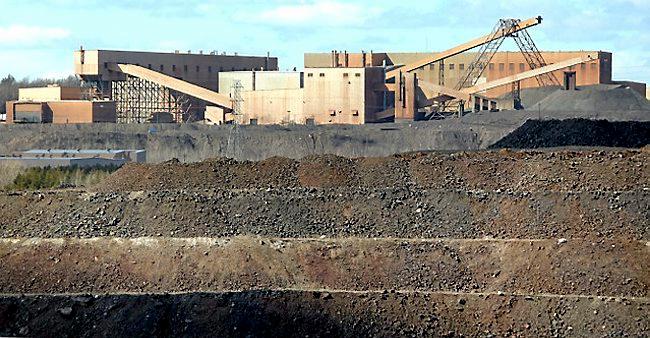
‘People on the Range are nervous’ as Japanese company announces deal to buy US Steel
DULUTH — U.S. Steel shaped Minnesota’s Iron Range, transforming the region from a frontier to a key part of the country’s industrial complex.
“U.S. Steel isn’t just a really big company that employs a lot of people in the area,” said Aaron Brown, an Iron Range historian and author. “It’s the reason that a lot of towns that currently exist were formed.”
While the Merrit Brothers began shipping ore from the Mesabi Range in 1892, East Coast financiers like John D. Rockefeller, Andrew Carnegie, Henry Oliver, J.P. Morgan and Charles Schwab began to take over or peddle influence, resulting in the founding of the United States Steel Corp. in 1901.
And that, Brown said, is when the Iron Range transformed.
But now, the iconic Pittsburgh-based company is being sold to Japan’s Nippon Steel in a $14.9 billion deal announced Monday.
No big changes have been relayed to the more than 1,800 employees at U.S. Steel’s Minntac and Keetac iron ore mines and pellet plants in Keewatin and Mountain Iron, and Nippon vowed to honor union contracts.
Nippon also touted the Minnesota ore operations in presentations on the deal.
But uncertainty hangs over the Iron Range, Brown said.
“People on the Range are nervous … anyone would be under the circumstances, and I think that’s appropriate,” Brown said. “And I think we don’t know what their long-term goal is going to be with even the iron mines in Minnesota.”
U.S. Steel also owns a 15% stake in Hibbing Taconite. Cleveland-Cliffs owns the remaining stake in Hibbing Taconite and manages the mine and plant.
Tony Barrett, professor emeritus of economics at the College of St. Scholastica in Duluth, said as long as Nippon keeps steelmaking facilities open throughout the country, the Minnesota mines that supply the blast and electric-arc furnaces with pellets will remain needed.
“But if Nippon steel, thinking worldwide, decides they don’t need U.S. steel-producing capacity and they cut back, then that has implications for the demand of U.S. iron ore, and obvious U.S. Steel mines on the Range,” Barrett said
In a joint news release, U.S. Steel and Nippon said all collective bargaining agreements with the United Steelworkers union would be honored.
But the United Steelworkers, which represents employees at every operating iron ore mine in Minnesota, would have rather seen U.S. Steel bought by Cleveland-Cliffs, the only other iron ore mining company in the country. Like U.S. Steel, it runs steelmaking facilities across the country, too.
“To say we’re disappointed in the announced deal between U.S. Steel and Nippon is an understatement, as it demonstrates the same greedy, shortsighted attitude that has guided U.S. Steel for far too long,” United Steelworkers International President David McCall said in a statement Monday.
“We remained open throughout this process to working with U.S. Steel to keep this iconic American company domestically owned and operated, but instead it chose to push aside the concerns of its dedicated workforce and sell to a foreign-owned company.”
Cliffs had made a bid in late July to buy U.S. Steel for $7.3 billion, or $35 per share. Cliffs’ latest offer was above $40 per share, CNBC reported last week. Nippon’s offer was $55 per share.
In a news release Monday morning, Cliffs President and CEO Lourenco Goncalves said its purchase of U.S. Steel would have meant “a union-friendly American champion among the top-10 steelmakers in the world.”
“Even though U.S. Steel’s Board of Directors and CEO chose to go a different direction with a foreign buyer, their move validates our view that our sector remains undervalued by the broader market, and that a multiple re-rating for Cleveland-Cliffs is long overdue,” Goncalves said. “We congratulate U.S. Steel on their announcement and wish them luck in closing the transaction with Nippon Steel.”
State Rep. Spencer Igo, R-Wabana Township, whose district includes Keetac, said the sale “opens the door for new possibilities on the Iron Range as Nippon’s acquisition of U.S. Steel will better position our region to play an important role in helping meet increased, global demand for steel.”
“There are many questions that will be answered in the weeks and months ahead, but I am encouraged that Nippon has made clear that they are committed to honoring all of U.S. Steel’s collective bargaining agreements that have been negotiated over the years,” Igo said. “Moving forward, I expect operations at Keetac and Minntac to continue uninterrupted and am hopeful that new technologies will expand opportunities in Minnesota.”
State Sen. Robert Farnsworth, R-Hibbing, represents the district with Keetac, Minntac and Hibbing Taconite. While he echoed Igo’s hope that the global reach could help the region and that Nippon is honoring collective bargaining agreements, he expressed concern for Nippon being a foreign company.
“My priority is and will always be protecting Range jobs … I remain concerned this iconic American company is being sold to a foreign company,” Farnsworth said in a statement. “I am monitoring this announcement to make sure our local interests and Minnesota workers are protected.”
Barrett noted the symbolism of a Japanese company buying U.S. Steel. In the late 1970s and early 1980s, cheap steel from Japan flooded the U.S. market, putting the hurt on the domestic steelmaking and iron ore mining industries.
“The symbolism of this really resonates with someone of my generation, because we witnessed the U.S. steel industry under attack from allegedly unfair imports from Japan,” said Barrett. “A lot of U.S. Steel’s long-term problems started from Japanese steel companies exporting to the United States.”
Foreign companies have owned Iron Range mines and pellet plants before.
But U.S. Steel is embedded in the identity of the Iron Range and its people. Brown noted fading paint of U.S. Steel logos still can be seen on many of the region’s landmarks.
He said the Iron Range’s relationship with U.S. Steel was always complicated. The company was “both lamented and beloved by people, sometimes the same people at different times,” he said.
“It’s the parent you had a complicated relationship with when you hear that they’re sick and that they’ve passed,” Brown said. “It’s still emotionally powerful.”
Related Articles
Billionaire has bought, demolished 7 homes on Duluth’s Park Point
Firefighters rescue dog from frigid waters of Duluth Ship Canal. Here’s the video.

